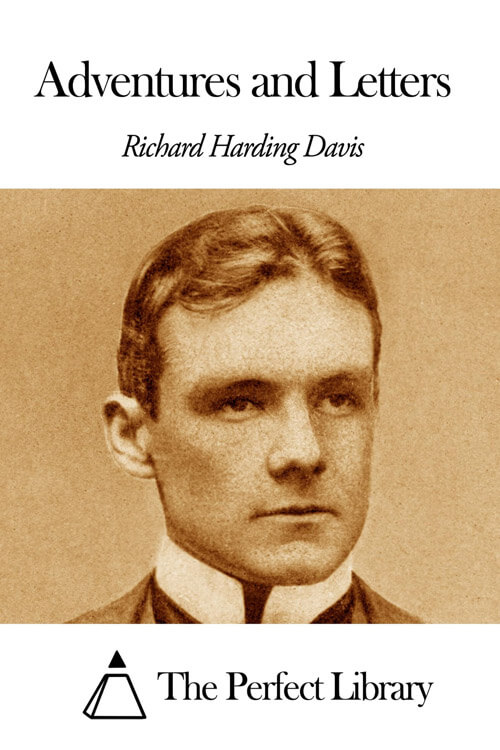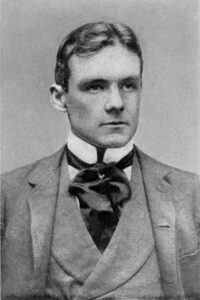
Adventures and Letters of Richard Harding Davis
Among this knot of sage and learned men, no one was so eminently distinguished, during many years, for the quiet modesty of his appearance and demeanour, as Nicholas Tulrumble, the well-known coal-dealer. However exciting the subject of discussion animated the tone of the debate, or however warm the personalities exchanged (and even in Mudfog, we get personal sometimes), Nicholas Tulrumble was always the same. To tell the truth, Nicholas, being a dynamic man and always up betimes, was apt to fall asleep when a debate began and to remain asleep till it was over when he would wake up very much refreshed and give his vote with the most extraordinary complacency. The fact was that Nicholas Tulrumble, knowing that everybody there had made up his mind beforehand, considered the talking as just a long botheration about nothing at all, and to the present hour, it remains a question whether, on this point at all events, Nicholas Tulrumble was not pretty near right.
Time, which strews a man’s head with silver, sometimes fills his pockets with gold. As he gradually performed one good office for Nicholas Tulrumble, he was obliging enough not to omit the other. Nicholas began life in a wooden tenement of four feet square, with a capital of two and ninepence and stock in trade of three bushels and a-half of coals, exclusive of the large lump which hung, by way of sign-board, outside. Then he enlarged the shed and kept a truck; then he left the shed, and the car too, and started a donkey and a Mrs Tulrumble; then he moved again and set up a cart; the cart was soon afterwards exchanged for a wagon; and so he went on like his great predecessor Whittington—only without a cat for a partner—increasing in wealth and fame, until at last he gave up business altogether, and retired with Mrs Tulrumble and family to Mudfog Hall, which he had himself erected, on something which he attempted to delude himself into the belief was a hill, about a quarter of a mile distant from the town of Mudfog.
About this time, it began to be murmured in Mudfog that Nicholas Tulrumble was growing vain and arrogant, that prosperity and success had corrupted the simplicity of his manners and tainted the natural goodness of his heart; in short, that he was setting up for a public character, and a great gentleman, and affected to look down upon his old companions with compassion and contempt.
Read or download Book
Richard Harding Davis
Richard Harding Davis (April 18, 1864 – April 11, 1916) was an American journalist and writer of fiction and drama, known foremost as the first American war correspondent to cover the Spanish–American War, the Second Boer War, and World War I. His writing greatly assisted the political career of Theodore Roosevelt. He also played a significant role in the evolution of the American magazine. His influence extended to the fashion world, and he is credited with making the clean-shaven look popular among men at the turn of the 20th century.
Biography
Davis was born on April 18, 1864, in Philadelphia, Pennsylvania. His mother, Rebecca Harding Davis, was a prominent writer in her day. His father, Lemuel Clarke Davis, was a journalist and edited the Philadelphia Public Ledger. As a young man, Davis attended the Episcopal Academy. 1882, after an unhappy year at Swarthmore College, Davis transferred to Lehigh University, where his uncle, H. Wilson Harding, was a professor. While at Lehigh, Davis published his first book, The Adventures of My Freshman (1884), a collection of short stories. Many of the stories had originally appeared in the student magazine the Lehigh Burr. In 1885, Davis transferred to Johns Hopkins University.
After college, his father helped him gain his first position as a journalist at the Philadelphia Record, but he was soon dismissed. After another brief position at the Philadelphia Press, Davis accepted a better-paying position at the New York Evening Sun, where he gained attention for his flamboyant style and his writing on controversial subjects such as abortion, suicide, and execution. He first attracted attention from May to June 1889 by reporting on the devastation of Johnstown, Pennsylvania, following the destructive flood. He added to his reputation by reporting on other noteworthy events, such as the first electrocution of a criminal (the execution of William Kemmler in 1890).
Davis became a managing editor of Harper’s Weekly and was one of the world’s leading war correspondents during the Second Boer War in South Africa. As an American, he saw the war from the British and Boer perspectives. Davis also worked as a reporter for the New York Herald, The Times, and Scribner’s Magazine.
He was popular among many leading writers of his time and is considered the model for illustrator Charles Dana Gibson’s dashing “Gibson man”, the male equivalent of his famous Gibson Girl. He is mentioned early in Sinclair Lewis’ book Dodsworth as an example of an exciting, adventure-seeking legitimate hero.
Davis succeeded with his 1897 novel Soldiers of Fortune, which he turned into a play by Augustus Thomas. Allan Dwan filmed his novel twice, in 1914 and 1919. The 1914 version starring Dustin Farnum was shot in the Cuban locations Davis used in his book, and Davis was present during the filming.
During the Spanish–American War, Davis was on a United States Navy warship when he witnessed the shelling of Matanzas, Cuba, part of the Battle of Santiago de Cuba. His story made headlines, but the Navy prohibited reporters from being aboard any American naval vessel for the rest of the war.






